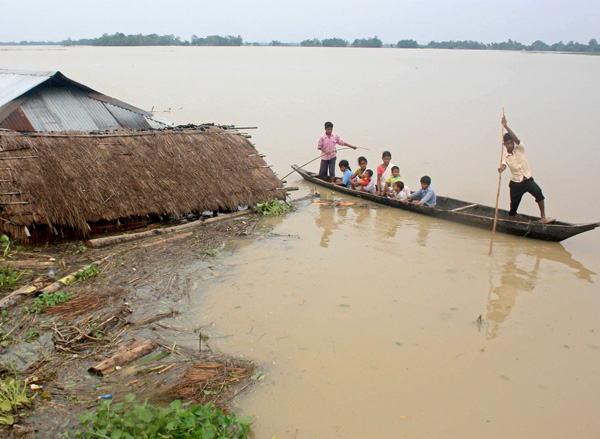"Many villages are still under water, and houses along with the possessions -- including cattle -- have been washed away," Father Purthy said as he returned to his base from remote villages to assess damage and to map out the church's rehabilitation program for those affected.
"These villages remain marooned and inaccessible as even roads have been washed away," said Father Purthy.
Heavy monsoon rains in late June, along with floodwaters from Bhutan, have inundated thousands of villages and submerged roads and towns in 23 of 27 districts of Assam state, which is traversed by the Brahmaputra River.

Flood-affected residents move from their damaged homes in the Indian state of Assam June 27. Incessant heavy rains in northeast India have caused massive flooding and landslides, leaving at least 126 people dead and affecting 3 million others. (CNS photo /Reuters)
Babita Alick, team leader for disaster management of Caritas India, the social action wing of the Indian church, told Catholic News Service that three medical teams led by doctors have been reaching out to villagers sheltered in relief camps run by the government in schools and other centers.
"The conditions in the relief camps are appalling. Women, children and cattle are jostling for space in the camps. There is hardly any toilet facility in the camps with over 2,000 people," Alick said from New Delhi after visiting the flood-affected areas.
"Medical attention is the greatest necessity, with dead carcasses of cattle floating around and acute shortages of drinking water. Thousands are camping on roadsides as entire villages have been under water," Alick said.
She said Caritas India was working with the Tezpur Diocese, focusing on running medical camps in the relief camps and roadsides, while water and sanitation programs are also being instituted in inundated areas.
"Once the water recedes and families begin to return back to their villages, we will focus on livelihood restoration and shelter repair," Alick said.
Cassie Dummett, head of programming of Catholic Relief Services in India, told CNS that the agency had distributed safe drinking water and hygiene kits to nearly 6,000 families.
CRS is involving trainees and beneficiaries of the Community-based Disaster Risk Reduction program it had already started in some of the flood-affected villages.
"We are planning for long-term rehabilitation programs as the lives of the villagers have been ruined and they are in no-man's land," Rekha Shetty, who works in disaster management for CRS, told Catholic News Service after visiting marooned villages by boat.


